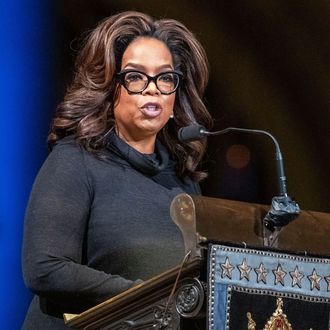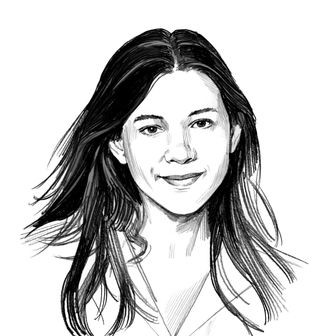
On Thursday, some of the greatest living literary giants gathered at the Cathedral of St. John the Divine in New York to pay tribute to the late Nobel Prize-winning author Toni Morrison, who died at the age of 88 this August. The Celebration of Life was open to the public and included speeches from authors, academics, and literary figures including Angela Davis, Ta-Nehisi Coates, David Remnick, and Fran Lebowitz. Among the speakers was Oprah Winfrey, who produced and starred in the 1998 film adaptation of Morrison’s Beloved, and whose Book Club brought Morrison’s novels to a wide audience not often served by the literary world. Below, you can read a transcript of her stirring eulogy:
Good evening. I must say that I’ve been speaking since I was three years old in churches. I’m never nervous or intimidated, but writers are rock stars to me. So to have this entire row of rock stars, I’m shaking inside, I feel so honored to be in your presence. And thank you, Errol McDonald for inviting me to be here today. The first time I came face to face with Toni Morrison was in Maya Angelou’s backyard for a gathering of some of the most illustrious black people you’ve ever heard of, to celebrate Toni Morrison’s Nobel Prize victory. My head and my heart were swirling. Every time I looked at her, I couldn’t even speak. I had to catch my breath. And I was seated across from her at dinner, and there was a moment when I saw Ms. Morrison just gesture to the waiter for some water, and I almost tripped over myself trying to get up from the table to get it for her. And Maya said, “Sit down. We have people here to do that. You’re a guest.” So I sat down, I obeyed of course. But it was not easy, I tell you, to sit still or to keep myself inside my body. I felt like I was all of seven years old. Cause after all, she was there. And so many others, that day. Mari Evans, Sister Angela Davis was there, Nikki Giovanni was there, Rita Dove was there…. It was a writer’s mecca. And I was there, sitting at the table, taking it all in. And as I look back, that day remains one of the great thrills of my life.
You know, I didn’t really get to speak to Toni Morrison that day. I was just too bedazzled. But I had already previously called her up to ask about acquiring the film rights to Beloved. After I finished reading it, I found her number, called her, and when I asked her, is it true that sometimes people have to read over your work in order to understand it, to get the full meaning? She bluntly replied, “That, my dear, is called reading.” I was embarrassed but that statement actually gave me the confidence years later when I formed a book club on The Oprah Show to choose her work. I chose more of her books than any other author over the years. Song of Solomon, first, Sula, The Bluest Eye, and Paradise. And if any one of our viewers complained that it was hard going or challenging, reading Toni Morrison, I simply said: “That, my dear, is called reading.”
There was no distance between Toni Morrison and her words. I loved her novels but lately I’ve been re-reading her essays, which underscore that she was also one of our most influential public intellectuals. In one essay, she said: “If writing is thinking and discovering and selection and order and meaning, it is also awe and reverence and mystery and magic.” And this: “Facts can exist without human intelligence, but truth cannot.” She thought deeply about the role of the artist and concluded that writers are among the most sensitive, the most intellectually anarchic, most representative, most probing of all the artists. She believed it was a writer’s job to rip the veil off to bore down to the truth. She took the canon, she broke it open. Among her legacies were writers she paved the way for, many of them here, in this beautiful space tonight, celebrating her. Toni Morrison was her words, she is her words, for her words often were confrontational. She spoke the unspoken, she probed the unexplored. She wrote of eliminating the white gaze, of not wanting to speak for black people, but wanting to speak to them. To be among them. To be among all people. Her words don’t permit the reader to down them quickly and forget them, we know that. They refuse to be skimmed. They will not be ignored. They can gut you, turn you upside down, make you think you just don’t get it. But when you finally do, when you finally do and you always will, when you open yourself to what she is offering, you experience, as I have many times reading Toni Morrison, a kind of emancipation. A liberation, an ascension to another level of understanding. Because by taking us down there, amid the pain, the shadows, she urges us to keep going, to keep feeling, to keep trying to figure it all out, with her words and her stories as guide and companion. And she asks us to follow our own pain, to reckon with it, and at last, transcend it. While she’s no longer on this earth, her magnificent soul, her boundless imagination, her fierce passion, her gallantry… she told me once, “I’ve always known I was gallant.” Who says that? Who even knows they are gallant? Well, her gallantry remains always to help us navigate our way through. I’d like to close the evening with an excerpt. You know, I have many favorite passages when it comes to Toni’s body of work… but this one, from Song of Solomon, never fails to inspire awe in me. And for that, and so much else, I say thank you to the singular, monumental, gallant writer.
“He had come out of nowhere, as ignorant as a hammer and broke as a convict, with nothing but free papers, a Bible, and a pretty black-haired wife, and in one year he’d leased ten acres, the next ten more. Sixteen years later he had one of the best farms in Montour County. A farm that colored their lives like a paintbrush and spoke to them like a sermon. ‘You see?’ the farm said to them. ‘See? See what you can do? Never mind you can’t tell one letter from another, never mind you born a slave, never mind you lose your name, never mind your daddy dead, never mind nothing. Here, this here, is what a man can do if he puts his mind to it and his back in it. Stop sniveling,’ it said. ‘Stop picking around the edges of the world. Take advantage, and if you can’t take advantage, take disadvantage. We live here. On this planet, in this nation, in this country right here. Nowhere else! We got a home in this rock, don’t you see! Nobody starving in my home; nobody crying in my home, and if I got a home you got one too! Grab it. Grab this land! Take it, hold it, my brothers, make it, my brothers, shake it, squeeze it, turn it, twist it, beat it, kick it, kiss it, whip it, stomp it, dig it, plow it, seed it, reap it, rent it, buy it, sell it, own it, build it, multiply it, and pass it on — can you hear me? Pass it on!’”


